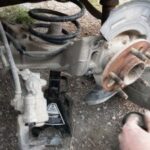If Exeter Finance holds your auto loan, and you’re facing financial difficulties, you might be worried about car repossession. Exeter Finance specializes in providing car loans to individuals with less-than-perfect credit, often at higher interest rates. Understanding their repossession practices is crucial to protect your vehicle and financial future. This article will delve into the timeline for Exeter Finance repossession, your rights, and how to avoid losing your car.
Exeter Finance and Car Repossession: What to Expect
Exeter Finance partners with thousands of dealerships across the nation, offering financing options to car buyers who may not qualify for traditional auto loans. While this can be a lifeline for many, it often comes with higher interest rates reflecting the increased risk to the lender. When payments are missed, repossession becomes a serious possibility.
So, how long does Exeter Finance typically wait before repossessing a car? While there’s no exact, universally applicable timeframe, Exeter Finance is likely to initiate repossession after 3 to 5 months of missed payments. This window can vary depending on several factors, including:
- Your Loan Agreement: The specific terms outlined in your contract with Exeter Finance are paramount. Review your agreement carefully for clauses related to default and repossession.
- State Laws: Repossession laws differ from state to state. Some states may have stricter regulations regarding notice requirements and the timing of repossession.
- Communication History: If you have been proactive in communicating with Exeter Finance about your financial situation and attempting to find solutions, they might be slightly more lenient. However, this is not guaranteed.
It’s important to understand that auto loan agreements typically define “default” as failing to meet the payment schedule. Even missing one payment can technically put you in default, but lenders usually allow a grace period before taking action. However, consistently missing payments for several months signals a higher risk of loss for Exeter Finance, prompting them to consider repossession to recoup their investment.
The Repossession Process by Exeter Finance
Understanding the repossession process can help you anticipate what to expect and take timely action. Here’s a general overview:
-
Notice of Default: Before repossessing your vehicle, Exeter Finance is generally required to send you a notice of default. This notice will inform you that you are behind on your payments and at risk of repossession. It should outline:
- The amount you are past due.
- A deadline to make payment and cure the default.
- Exeter Finance’s intent to repossess the vehicle if the default is not cured.
- Your rights in the repossession process.
-
Repossession: If you fail to bring your account current by the deadline stated in the notice, Exeter Finance can legally repossess your car. In most states, they can repossess your vehicle without a court order, as long as they do not “breach the peace.” Breach of peace can include physically harming you, entering a locked garage without permission, or using threats or intimidation. Repossession agents are typically hired to locate and seize the vehicle.
-
Post-Repossession: After repossession, Exeter Finance has a few options:
- Reinstatement: In some cases, and depending on your loan agreement and state law, you may have the right to reinstate your loan. This means paying the past-due amount, plus repossession fees and other charges, to get your car back and resume your original loan terms.
- Redemption: You may also have the right to redeem the vehicle. Redemption involves paying off the entire remaining loan balance, plus repossession costs and fees, to reclaim ownership of your car. This is often financially challenging after falling behind on payments.
- Vehicle Sale (Auction): Most commonly, Exeter Finance will sell the repossessed vehicle, usually through a public auction or private sale. They are legally required to make commercially reasonable efforts to get a fair price for the car.
-
Deficiency Balance: After the car is sold, the proceeds are applied to your outstanding loan balance, including repossession and sale expenses. If the sale price is less than what you still owe, you will be responsible for the deficiency balance. Exeter Finance can pursue you for this remaining debt through collection agencies and potentially legal action, including lawsuits and wage garnishment.
How to Avoid Exeter Finance Repossession
The best way to avoid car repossession is to proactively manage your auto loan and address financial difficulties as soon as they arise. Here are actionable steps:
- Prioritize Timely Payments: Make your car payments a top priority in your budget. Set up automatic payments if possible to avoid missed deadlines. Even a few days of delay can trigger late fees and negatively impact your credit.
- Communicate with Exeter Finance Immediately: If you anticipate or experience difficulty making payments, contact Exeter Finance immediately. Do not wait until you are several months behind. Explain your situation honestly and explore potential solutions.
- Negotiate a Payment Plan: Exeter Finance may be willing to work with you to create a modified payment plan that is more manageable for your current financial situation. This could involve temporarily reducing your monthly payment or adjusting the loan term. However, keep in mind they are not obligated to agree to such arrangements.
- Explore Financial Assistance Options: Investigate whether you qualify for any financial assistance programs that can help you catch up on your car payments. These may include government assistance, non-profit organizations, or credit counseling services.
- Consider Voluntary Repossession (as a last resort): While it negatively impacts your credit, voluntary repossession is generally less damaging than a forced repossession. By voluntarily surrendering the vehicle, you may avoid repossession fees and have some control over the process. However, you will still likely owe a deficiency balance.
Customer Reviews and Complaints about Exeter Finance Repossession
It’s wise to be aware of the experiences of other Exeter Finance customers. Online reviews and complaints can offer insights into their typical practices. The Better Business Bureau (BBB) and Google Reviews are common platforms for customer feedback.
Exeter Finance’s BBB profile, while not BBB-accredited, reveals a low customer review rating. Similarly, Google Reviews often reflect negative experiences. Common complaints frequently revolve around:
- High Interest Rates: Customers frequently express dissatisfaction with the high interest rates charged by Exeter Finance, making loans expensive and difficult to repay.
- Poor Communication: Many reviewers report difficulties communicating with Exeter Finance customer service, particularly when facing financial challenges.
- Unexpected Repossessions: Some complaints mention repossessions occurring sooner than expected, or with insufficient communication.
These reviews underscore the importance of proactive communication and diligent payment management when dealing with Exeter Finance.
Alternatives to Repossession: Debt Settlement with SoloSettle
If you are struggling with high-interest auto loan debt from Exeter Finance and facing potential repossession, debt settlement can be a viable alternative. Debt settlement involves negotiating with your lender to pay a lump sum that is less than the full amount owed. Once the settled amount is paid, the remaining debt is forgiven.
SoloSettle offers a tech-driven approach to debt settlement, making the negotiation process more streamlined and manageable. SoloSettle’s platform helps you:
- Organize and Manage Offers: Easily send and receive settlement offers to Exeter Finance through a user-friendly interface.
- Track Progress: Keep track of your negotiation progress and payment schedules.
- Secure Payments: Safely manage and transfer settlement payments once an agreement is reached.
Debt settlement can help you avoid repossession, resolve your debt for less than you owe, and start rebuilding your financial future.
Conclusion
Understanding how long Exeter Finance takes to repo cars is essential for anyone with an auto loan from this lender. While the exact timeline can vary, repossession is likely to occur after 3 to 5 months of missed payments. Proactive communication, diligent payment management, and exploring options like debt settlement are crucial steps to avoid repossession and protect your vehicle. If you’re facing potential repossession from Exeter Finance, consider exploring debt settlement with SoloSettle to regain control of your financial situation.


